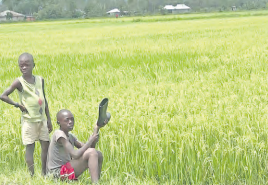

A new initiative aimed at supporting micro, small and medium enterprises in rice production has been launched. The Climate-Smart Decision Support System Project focuses on women and youth-led businesses and is set to benefit at least 120 MSMEs in Kenya and Nigeria.
It was launched by the African Agricultural Technology Foundation in partnership with several organisations. Dr Kayode Sanni, the rice project and data management lead at AATF said the project will provide precise climate information during critical stages of rice cultivation.
Speaking at the project inception meeting in Kirinyaga county, he said farmers will receive data on weather patterns, rainfall, temperature changes and other climate factors.
This information will aid in making timely decisions related to planting, irrigation and overall crop management, ultimately enhancing productivity and resilience.
“The aim of the project is to help these businesses use climate data such as weather patterns, rainfall, temperature changes, and other climate factors to inform their agricultural decisions,” he said.
Sanni said the data will help farmers make timely and effective choices about planting, irrigation and other farming activities, to improve productivity and resilience.
“The data will be turned into easy-to-follow advice and shared with farmers through an internet application or by sending bulk messages on their phones. This will help farmers make smart choices about growing and managing their rice crops, boosting their productivity and improving their income,” he said.
Sanni said the Climate-Smart Decision Support System Project will integrate locally generated climate data with satellite systems to offer rice farmers more accurate and relevant weather information.
Besides improving productivity, it will also help rice farmers reduce risks and support environmentally friendly farming practices.
The project is funded through the Grand Challenges, an initiative of the Bill & Melinda Gates Foundation. Project partners include Michigan State University, the Cereal Growers Association of Kenya, the University of Nigeria, Nsukka and Benue State University in Nigeria.
“Women and youth-run rice micro, small and medium enterprises have specific climate information needs that is crucial for decision making across the rice value chain activities that they engage in, such as production, inputs, services and marketing,” Sanni said.
“In production, for example, timely information on rainfall patterns, temperature trends and extreme weather forecasts will guide planting schedules, irrigation management and pest control strategies in addition to supporting risk management decisions."
Dr Cecilia Limera, the principal investigator for the project, said when farmers know when to expect heavy rainfall or prolonged dry spells, they can adjust their cultivation practices and choose resilient varieties.
“Climate-related information on pest and disease
outbreaks and their expected prevalence enables farmers
and MSMEs to anticipate and mitigate risks through
timely pest management strategies and the use of resistant crop varieties or biological controls,” she said.











